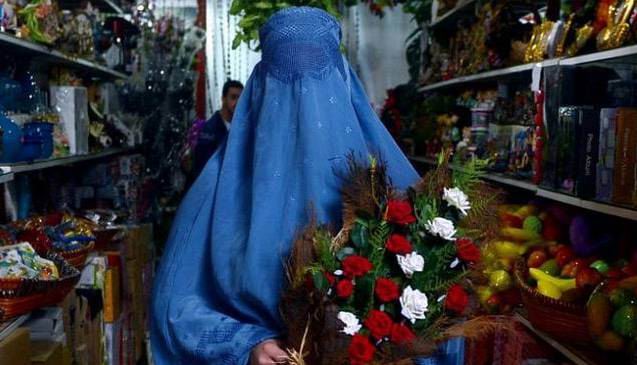KABUL (Khaama Press): Laila, a flower vendor, is worried about the lifespan of her flowers as autumn comes to an end and winter, with its snow and rain, approaches. She transitioned from being a teacher during the republican era to becoming a flower seller during the reign of the Taliban, which has provided her with a satisfying income. She says, “Selling flowers means selling love, and right now, I am in the business of selling love.” The return of the Taliban administration in Afghanistan marked a significant turning point in recent Afghan history, as it brought about profound changes in the lives of women and imposed a crisis of unemployment and economic hardship on the people. Since this turning point, women have been less visible in public interactions, and according to reports from Amnesty International, women have been excluded from the social sphere. Laila, a 52-year-old woman, has turned to selling flowers in this tumultuous environment. She was once a teacher and claims to have educated hundreds of girls and boys with pen and paper. Before the Taliban administration, opportunities for girls’ education were available, but Laila’s husband did not allow their daughters to go to school, leading to her separation from him. However, with the arrival of the Taliban government, girls’ education has been prohibited, leaving Laila unsure of what to do with this new restriction. Laila says, “Perhaps nowhere else has it happened that a mother is a teacher, yet her children are not allowed to attend school.” In Laila’s view, the inability of women in Afghanistan to give birth to sons leads to deep conflicts between spouses. Laila is one of the women who have faced this issue, and the lack of a male child has strained her relationship with her husband. Access to quality education for women in Afghanistan has been limited, and Laila, who has endured many hardships for the sake of her two daughters, is increasingly concerned about their future due to these restrictions. She believes that proper education empowers women to achieve financial independence, intellectual freedom, and a better social position. Throughout history, women have made significant efforts to fight for gender equality. However, many differences and limitations in women’s access to opportunities and resources still persist. Changing this situation requires the collective efforts of society, including both men and women, as well as political, social, and legal changes. Why did the former teacher turn to selling flowers? After the rise of the Taliban in Afghanistan and its new policy of canceling pension payments, Laila no longer receives her retirement benefits. This ongoing situation and the economic shock that disrupted people’s lives have put tremendous pressure on Laila. Laila says, “I tried seeking foreign aid to find work. I struggled for several days, but in the end, I would return home at dinner time.” After several days of effort, Laila finally bought several flower branches from the flower vendors in Kabul’s New City with the money she had. By selling these branches, which come in red and white colors, she managed to cover her living expenses and support her two young daughters. Her business has expanded since then, and she is content with her income. However, with the arrival of winter and the end of the flower season, her business is dwindling. She is trying to find an alternative source of income, but for now, she earns 600 Afghanis daily from selling flowers, which she uses to pay rent and support her family. Laila is frustrated by the societal judgment that occurs when someone, especially a woman, engages in challenging work in Afghanistan. She notes that while such work is stigmatized, doing similar work abroad is considered honorable. Despite her separation from her husband, Laila remains concerned. She says, “I fear that one day, my husband and his sons will see me in the streets selling flowers and still judge me, even though there’s no shame in this work; the shame is in being burdensome.” When Laila carries flowers in the street for sale, she is often mistaken for a beggar, and the police try to take her to the collection areas for beggars, as the process of gathering beggars has recently begun in Kabul. However, Laila strives to continue her work more systematically, wearing clean clothes. In some cases, she is forced to hide her flowers. Currently, Laila faces other crises that have caused significant concerns for her and her family. The primary reason for these crises is the absence of a male child and the lack of a male guardian, as per Afghan social norms. Given that Laila lives alone with her two daughters, aged between 19 and 22, they face larger issues. This issue is one of the challenges women in Afghan society frequently encounter, and what makes it more problematic is the “negative perception of others” towards three women living without a male guardian. When Laila and her young daughters try to find a rental house, landlords often refuse because they lack a male “mahram.” Laila, with tears in her eyes, says, “Generally, it may not be good to say this, but in most cases, they rent the house to us because they think we are not proper women, and they believe that we can fulfill any requests made of us. Nevertheless, we are trying to find another house and separate from there.” As Laila speaks about the challenges in her life, she wipes away her tears with her shawl and says, “I achieved my own desires, and my daughters received an education. That’s enough for a mother who was a teacher in the past.” Considering the prohibition of girls’ education, I asked Laila, “What did you gain from your education that made you endure all these difficulties?” She replied, “Education taught me humanity.” Laila’s life story represents the lives of thousands of other women in this country. Women who face challenges such as work, income, and difficult lives for various reasons, including domestic violence, gender inequality, and hundreds of other difficulties, have never tasted the sweetness of life.







